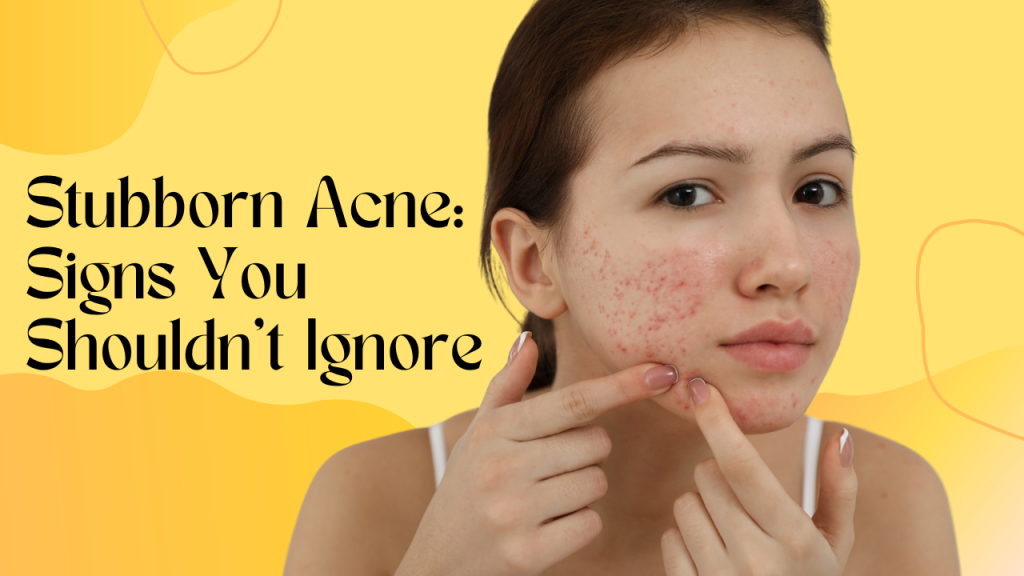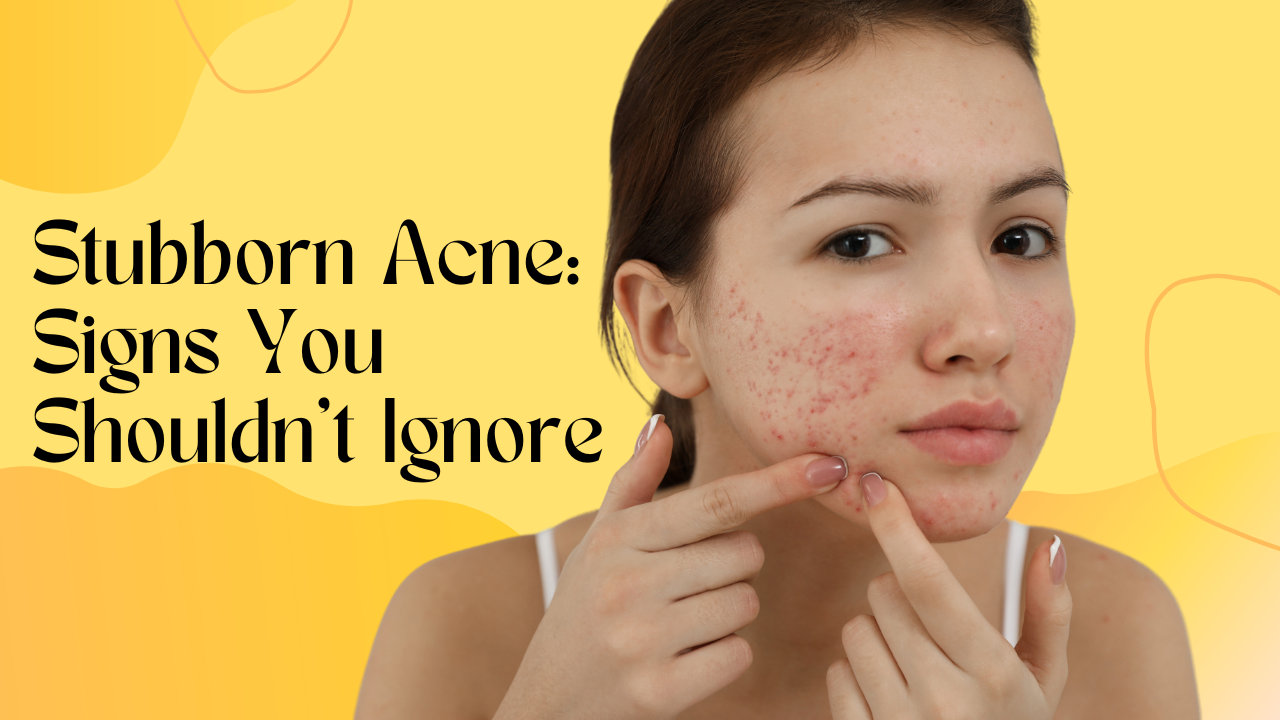Acne is a common skin condition that can take the form of blackheads, whiteheads, or pimples affecting people of all ages and can be a source of discomfort and insecurity.
Teenagers and young adults most often get acne, but it can also happen during adulthood for many people.

Let’s assume you are waking up one day to find one or two pimples on your face. An occasional pimple may seem transient, but imagine the sinking feeling when you realize that your face is covered in acne!
This comprehensive guide will review the Stubborn Acne: Signs You Shouldn’t Ignore. Exploring the term Acne, we will cover related terms like what Acne is, Signs You Shouldn’t Ignore, how to get away from Acne, What Causes Acne?, etc.
Contents
Introduction
Acne is something that teenagers often deal with, but anyone can get it. It’s a skin problem that happens when oil and dead skin clog up your hair follicles. This can be of different reasons for acne, like blackheads, whiteheads, and more severe types like cystic acne.
Acne normally shows up on the face, but it can also pop up on your chest, shoulders, and back. It can make your skin red, and sore, and cause breakouts over big areas. While it’s not a serious problem, bad acne can leave scars and make you feel upset.
What is Acne?
Acne also known as acne vulgaris is a common skin problem where your skin pores get blocked. These blockages can cause blackheads, whiteheads, and different kinds of pimples. Pimples are bumps on your skin filled with pus and can sometimes hurt.
Who can acne affect?
Acne is most often seen in teenagers and young adults going through hormone changes, but it can also happen when you’re an adult. It’s more common in women and people who were born female. If your family has a history of acne, you might be more likely to get it too.
What causes acne?
Acne is caused by blocked hair follicles or pores. Hair follicles are tiny tubes that hold a hair strand. Many glands empty stuff into these follicles. If too much stuff gets inside a follicle, it gets blocked. This is how your pores can get clogged.
- Sebum: This is like a natural skin oil that helps protect your skin.
- Bacteria: A little bit of bacteria is normal and lives on your skin. But if there’s too much, it can block your skin pores.
- Dead skin cells: Your skin is always removing old cells to make space for new ones. Sometimes, these old cells can get entangled in the tiny holes where your hair grows out of your skin.
When the tiny holes on your skin get blocked, stuff gets trapped and causes a spot or pimple. This can make the area around the spot red, swollen, and painful, which is your body’s way of reacting to the blockage.
Also Read: How to Get Glowing Skin in 12 Simple Home Remedies?
How acne can be treated?
There are many ways to deal with acne, and what works best can depend on things like how old you are, what kind of acne you have, and how bad it is. A skin specialist might suggest you take medicine, apply creams or lotions to your skin, or take special treatments. The aim is to stop new spots from appearing and help heal the ones you already have.
Acne Sign: 10 signs of Acne you should be careful always
1. Whiteheads
Whiteheads, also called closed comedones, are tiny blocked pores that look white or the same color as your skin. They happen when dead skin cells, oil, and bacteria block your skin’s pores. Whiteheads are a usual sign of acne and can show up anywhere on your face or body. They’re often the first signs of acne and can turn into worse types of acne if not taken care of properly.
2. Blackheads
Blackheads are blocked pores that are open and have a dark color. They’re caused by the same things as whiteheads, but because the pore is open, the stuff blocking it reacts with the air and turns black. Even though some people might think the dark color is dirt, it’s just oil and skin cells that have reacted with the air.
3. Hormone imbalance
Androgens are hormones that are mostly found in men, but women have them too, just in smaller amounts. Sometimes, the levels of these hormones can get out of control. This often happens during times like puberty, pregnancy, menopause, or menstrual periods. When this happens, it can cause hard-to-treat acne to appear on the skin. This kind of acne usually doesn’t respond well to the usual creams and lotions that are used to treat acne.
Hormone imbalance can also mean a condition called polycystic ovarian syndrome, or PCOS. This is a common problem for women these days because of stress and changes in daily habits. PCOS can make your body resist insulin, a hormone that controls sugar levels in your blood. This can lead to acne and scars on your skin. So, it’s important to manage stress and maintain healthy habits to keep your hormones balanced and your skin clear.
4. Tender Bumps
When your hair roots get swollen and turn into small, red, sore bumps, it could be a sign of acne starting. These bumps can be tender when you touch them and might itch a bit. This is a kind of acne called ‘papules’.
5. Pimples
Pimples, also known as pustules, are like small bumps that are red and tender. They have white pus at their tips. This happens when the pores in your skin get blocked and then get infected. This type of acne is more severe than others. Also, they are more likely to leave scars on your skin after they heal. So, taking care of your skin is important to prevent pimples.
6. Diet
Eating oily foods, chocolates, and snacks full of sugar can be bad for your skin. These foods have something called a high glycemic index. This means they can make your body produce more insulin than usual. When this happens, your body also makes more sebum, an oily substance that can lead to acne. In the same way, foods that have a lot of saturated fats can make acne worse. So, if you want to keep your skin healthy, it’s a good idea to watch what you eat.
7. Skin care routines
Not understanding your skin type can lead to problems. Using certain creams, lotions, and cleansers can remove the natural oils from your skin. Also, harsh cleansers or rough exfoliants can harm your skin’s protective layer, letting bacteria in and causing acne. This makes acne creams less effective. Another common mistake is not removing makeup properly, which can slow down the healing of acne.
8. Stress levels
In today’s world, it’s become common to be stressed. But “bad” stress can harm your body in many ways. It can weaken your skin’s protective layer and mess up your hormones, particularly your cortisol levels. It can also lead to problems with your digestion. Being stressed all the time can cause inflammation and increase oil production in your skin, leading to blocked pores and worsening acne. If not addressed, it can become difficult to manage and get rid of acne effectively.
9. Thyroid disorders
Thyroid disorders are problems related to the thyroid gland. This gland makes hormones that help your body use energy and control many body functions. When you have a thyroid disorder, it changes the rate at which skin cells are replaced, leading to a buildup of skin cells on the surface and causing acne. It also slows down your skin’s ability to heal and repair itself.
10. Oily skin
If you often notice that your skin has an oily feel to it, this can be a sign that your skin is producing more oil than usual. This is a common symptom connected with acne. The sebaceous glands in your skin, which are responsible for producing oil, might be overactive. When these glands produce too much oil, it can accumulate on the surface of your skin. This excess oil can then block your pores, which are the small openings in your skin where hair follicles grow. Blocked pores can trap bacteria and dead skin cells, leading to inflammation and the formation of acne.
Conclusion
Spotting acne early can help you handle this common skin issue. Things like whiteheads, blackheads, and red patches on your skin show that your pores might be clogged. This can happen when dead skin and too much oil from your skin’s oil glands block your pores.
Acne is pretty normal, especially during the teen years. But if you don’t take care of it, it can stick around even when you’re an adult. So, it’s important to keep up with a good skincare routine to stop new acne from forming and keep your skin healthy.
So, it’s important to know what causes acne, like the bacteria that usually live on your skin, to handle it well. In the end, even though acne is a problem that lots of people deal with, you can handle it if you know what you’re doing and take good care of your skin.
Frequently Asked Questions
1. What is the early sign of acne?
The first thing you usually see when you get acne is whiteheads or blackheads. These happen when your pores get blocked with oil and dead skin
2. How can you manage acne?
To handle acne, you need to stick to a skincare routine. This means washing your face softly, not using strong skincare products, and keeping your hands and hair away from your face. It’s also very important not to squeeze or scratch your acne because it can make it worse and might even cause scars.
3. What are the common symptoms of acne breakouts?
Things like changes in your hormones, certain types of food, stress, and not getting enough sleep can often cause acne. Also, if you sweat a lot or live in a humid place, it can make your acne worse because sweat can irritate your skin.
4. What’s the difference between a pimple and acne?
A pimple is just one kind of acne. The word ‘acne’ is used to talk about different skin problems like pimples, blackheads, whiteheads, and cysts.

Dr. Roman Off is a multi-talented professional with expertise in psychology, nutrition, and content writing. She has a Doctorate in Clinical Psychology and is a psychologist with several years of experience helping individuals overcome mental health issues. In addition, Dr. Roman Off is a dietitian and nutritionist, specializing in helping clients achieve optimal health through proper nutrition and lifestyle changes.

